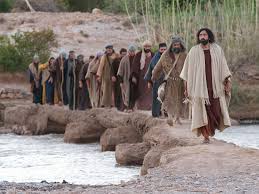HOMILY SUNDAY 13 – C
Responding to God’s Call
(1 Kings 19:16b, 19-21; Psalm 16; Galatians 5:1, 13-18; Luke 9:51-62)
************************************************************
Is your job just a job, or a vocation?
Be a disciple of Jesus: Proclaim the Kingdom; live in the Spirit and love one another.
The readings today portray a clear call to discipleship, beginning with the radical call of Elisha to be a prophet and his total response of leaving everything behind to follow Elijah.
In the gospel Jesus sets his face towards Jerusalem and in so doing reveals the depth of commitment demanded of those who would follow him as well as the nature of discipleship.
 The nature of discipleship, according to St. Paul in today’s readings, is to proclaim the kingdom, live in the Spirit and love one another. That call we can and must all do – regardless of our job or occupation. St. Paul, who was a tent-maker at times, proclaimed Jesus as his vocation.
The nature of discipleship, according to St. Paul in today’s readings, is to proclaim the kingdom, live in the Spirit and love one another. That call we can and must all do – regardless of our job or occupation. St. Paul, who was a tent-maker at times, proclaimed Jesus as his vocation.
For some, such as those who feel called to religious life and priesthood, the depth of commitment is total – they leave all and have no other priority but to proclaim and help bring about the kingdom of God. That commitment leads to many challenges.
No sooner had Jesus set his face to go to Jerusalem then he meets opposition. The rejection at the beginning of his journey corresponds to the rejection at Nazareth at the beginning of Jesus’ ministry. The rejection at the beginning of each of these major sections of the Gospel foreshadows the rejection that lies ahead in Jerusalem.
Jesus’ introduction to the journey to Jerusalem continues with a warning of the radical demands of discipleship. The three attempts at discipleship here set the call to discipleship above every other duty, whether care for self, care for the dead, or care for family. Would the enthusiastic volunteers be ready to follow him in the face of rejection?
Jesus’ demands are strong – they demand that the priority of service to the kingdom be set above every other priority. Those who have not responded to the call to the kingdom are like the dead, thus let the dead bury the dead. Those who have responded to the call to discipleship are no longer dead. Their concern should be with life and the living: “Go and proclaim the kingdom of God.”
Because faithfulness would require Jesus to lay down his life, the call to discipleship to Jesus inevitably means unconditional commitment to the redemptive work of God for which Jesus gave his life. The disciple will be like the Lord. Therefore, one should not rush into discipleship with glib promises. On the contrary, the radical demands of discipleship require that every potential disciple consider the cost, give Jesus the highest priority in one’s life, and having committed oneself to discipleship, move ahead without looking back. If one looks back when plowing, the furrow will be crooked.
According to Corbin Eddy, Jesus is both like and unlike Moses and Elijah. He will not call down fire from heaven like Elijah, for he portrays a totally non-violent God who never uses force. He will, however, ascend to God from Jerusalem like Elijah, but only after the Cross. Discipleship requires, even at this stage, unwavering commitment to what Jesus calls the kingdom of God.
For John Shea, the way of Jesus is “not belonging to the present order of things.” It entails a continual struggle to bring about a new understanding of God and neighbour and to create a society based on this new understanding. Any eager desire to follow Jesus must reckon with the difficulties of never belonging to what appears the natural way, the way of creating a home on earth as it is. The kingdom is about steadfastly moving into a future that people must desire more than anything else.
Jean Vanier is someone who was an example of a dedicated modern-day disciple of Jesus. At the height of his intellectual career, he felt the call of Jesus to form community with the mentally challenged and invited two men to join him in his home. That was the beginning of the L’Arche movement that continues to spread around the world, providing not institutions but homes for the mentally challenged. His faith in action and the lessons he learned made him a sought-after retreat master, motivational speaker and Templeton Prize winner.
The Eucharist is a meal for our journey as disciples and a sharing in the eternal banquet already. So, let us, like Jean Vanier, be disciples of Jesus – regardless of our career, and within that career, proclaim the Kingdom; live in the Spirit and love one another.




Thanks again for the wonderful homily and reflections about responding to God’s call. We are called to be his discipleship or missionary disciples once we receive the Eucharist during celebrations. The Eucharist meal is Jesus himself when he transformed the bread and wine into his flesh body and blood of Christ. He will inform us and sent us a message to proclaim the word of God and be his disciple to proclaim the Good News to others and communities. We should proclaim the kingdom of heaven or eternal life by having forgiveness and compassion. We are to love one another and love our enemies. Amen. Praise to you Lord Jesus Christ.
Thanks for the beautiful homilies and messages . Bishop Sylvain Lavoie. May God Bless you.